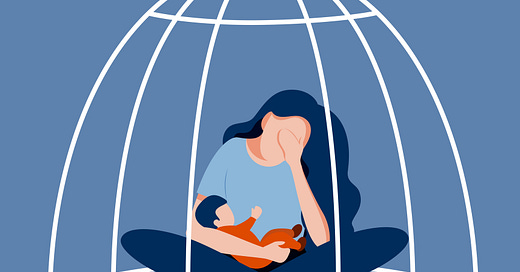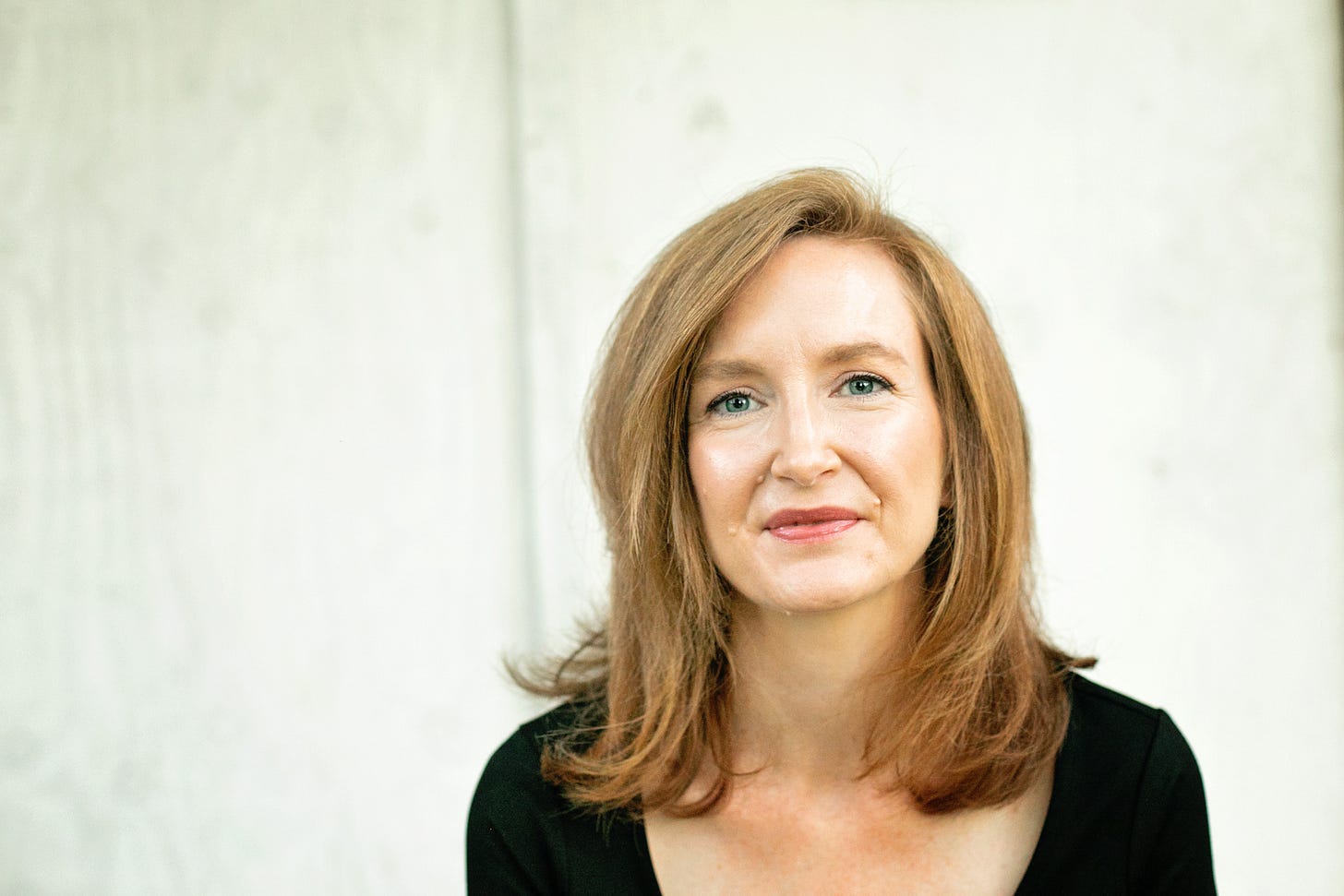What if Much of What We Believe a "Good Mom" Does is Completely Wrong?
Nancy Reddy, author of "The Good Mother Myth," breaks down our bad ideas about motherhood and exposes the misogynist social science behind them
Nancy Reddy is the author of the fascinating new book The Good Mother Myth, which takes on many sacred cows of modern motherhood and dissects the misogynist and sloppy social science that undergirds so much of what women today believe they have to do to be a good mother. Reddy discovered that some of the advice isn’t just misguided—it’s harmful to both mothers and children.
Reddy’s previous books include the poetry collections Pocket Universe and Double Jinx, a winner of the National Poetry Series. With Emily Pérez, she’s co-editor of The Long Devotion: Poets Writing Motherhood. Her essays have appeared in Slate, Poets & Writers, Romper, The Millions, and elsewhere. She writes the newsletter Write More, Be Less Careful. You can find her on Instagram at nancy.o.reddy or Substack at
.I hope you enjoy the following Q&A about some of the key findings in her book.
How did becoming a mother lead you to want to write this book?
As I write in the opening to the book, I’d expected motherhood to be hard—but hard in the way lots of other things, like school and work, had been. I’d thought it would be the kind of challenge I could work my way through by studying up and learning all the rules. And (spoiler alert!) that’s not actually how having a baby works. I found the first months and years of motherhood incredibly challenging in ways that dramatically shifted my sense of myself as a competent person.
The book began as an attempt to figure out why that was. Why, if motherhood was, as I’d been told for years before having my own kids, the “most natural thing in the world,” had it been so incredibly hard for me?
What would be the three top beliefs that many people hold about what makes a good mother that we need to let go of?
That a good mother is a “supermom” who knows best and can do it all on her own.
That there’s something magic in being a woman or having given birth that uniquely suits you to know what your baby needs.
That there’s such a thing as a “good mom” or that “goodness” is what babies and kids need. One of the main arguments of the book is that goodness is really a trap—it’s often much more about meeting external expectations or living up to someone else’s ideals. What our kids really need is care from warm, loving adults—and ideally, that would be lots of people, not just a mom!
In your research, you discovered that much of what many Americans believe is “ideal” mothering is based on flawed social science and even pure mythology. Can you share some examples?
Harry Harlow, a psychologist who spent most of his career at the University of Wisconsin-Madison, where I was a graduate student when my sons were born, did these iconic cloth mother studies with baby rhesus macaque monkeys. He separated newborn monkeys from their mothers, and they were raised in cages with surrogate mothers made of wire and terry cloth.
In some cages, the wire mother fed the babies, and in others, it was the cloth mother, but no matter which mother provided food, the baby monkeys clung to the cloth mothers. Harlow called his first paper on that research “The Nature of Love,” and he really did believe he’d discovered the origins of love in the comfort a mother gave her child.
Harlow believed he’d created a “perfect monkey mother,” “soft, warm, and tender, a mother with infinite patience,” and journalists were quick to leap from terrycloth and monkeys to human mothers. Harlow and his monkeys appeared on a popular CBS TV show, and he was featured in newspapers and women’s magazines as an expert on parenting. (Despite the fact that he spent almost no time with his own kids!)
Those photos of the mother and the baby totally content together, no matter that the baby was a monkey and the mother was a wire cone wrapped in terrycloth, became a powerful image of what a good mother looks like. Scientists like John Bowlby used Harlow’s research in the development of attachment theory, which has become really foundational to how we understand relationships.
But the longer story of that research is a lot darker. A totally adoring mother, one who never puts her baby down, who has no needs or interests of her own—that’s actually really far from healthy mothering. The babies raised by those “perfect monkey mothers” were really disturbed as adults. Those “perfect mothers” turned out to be really far from perfect!
Why do you think the male social scientists you identify in your book were able to get away with passing off their sloppy and cherry-picked “research” with such success?
The most obvious is that they were men with degrees from prestigious institutions and jobs that further burnished that prestige, so other scientists and the press were already poised to listen to them.
Their research findings also fit the cultural moment. The underlying message of their research—that what a baby most needed was the total devotion of a completely attentive mother—was one that aligned nicely with the cultural imperatives and economic anxieties of the postwar period in America and the UK, when lots of people worried about how to get women back at home and men back to work. A generation of women were told that science says the best thing they could do to serve their families and their country was to stay home with their babies!
I grew up as part of Generation X, and most of the mothers in my orbit seemed only vaguely aware of their children’s existence. Why do you think parents in subsequent generations have been so gripped by the social science telling them that “good moms” self-abandon to attend to their child’s every need?
Early parenthood is such a powerful moment for reflection about our childhoods—what our parents did that we want to repeat and how we want to do better. I was raised by a working mom who was a single parent through much of my childhood, and I always understood her to be an excellent parent—hard-working and high-achieving at work and super engaged at home.
And I still wanted to do better in some ways. She hated (hates!) cooking but made sure we had vegetables with dinner every night, and when I started my older kid on solid foods, I had to take that one step farther—like all homemade baby food made of organic local produce from the farmer’s market. (Why?)
I think lots of people enter parenthood really aware of how their own parents have failed them and wanting to spare their children whatever pain they’ve experienced. There’s so much talk online about breaking patterns and healing intergenerational trauma, and I think a lot of it has the whole thing backwards. It becomes another impossible standard mothers are trying to live up to—like, if I’m not perfectly self-regulating in every moment, I’m going to raise my kid to have the same challenges around self-regulation that I have. It puts too much pressure on moms and gives kids too little credit. You heal your own trauma by taking care of yourself, not by doing some kind of performative over-mothering of your own kids.
How big a role has misogyny played in the creation of “the good mother myth”?
A huge one! I think a lot of it is internalized misogyny—the way girls are often taught that their feelings and their needs aren’t worth taking seriously, so women enter motherhood oftentimes poised to prioritize their baby, their partner, their extended family, housework (and on and on) over themselves.
And I also think there’s the broader truth that, for a lot of women, motherhood is actually a route to power. We have a lot of cultural mythology around women being “supermoms,” and if you stand up and say, hey, I actually don’t have any superpowers, and in fact I’m barely getting by and could really use some help, you’re giving up a major source of status. A lot of us have been trained to be more comfortable martyring ourselves in the pursuit of these impossible standards than to give up the idea that we’re capable of reaching them.
Order The Good Mother Myth at your favorite bookseller.








This was interesting “And I also think there’s the broader truth that, for a lot of women, motherhood is actually a route to power.”
Sometimes I feel under valued in society because I don’t have kids. I do see reaching motherhood as some kind of higher status even though it’s rife with problems.
I keep picturing those baby monkeys with the wire “moms.” 😞
I’m not a mother, but I sure had one.
When I think back (I’m in the Boomer generation, born near the end of that era), I knew that my mother was sometimes miserable. She’d take to her bed sometimes on a Saturday, which forced my father, who was at work all week, to take care of us pretty much all day, and we knew to leave her alone.
I know that she was creative and smart. She actually got a full scholarship to a college an hour from home when she was in high school, but her father convinced her it wouldn’t work, she wouldn’t be able to handle it, etc., so instead she got married and had children.
At that time, very late fifties, early sixties, our culture did want mothers home with babies all the time. I’m sure my mother’s Saturday escapes to her bed were a way to deal with the week-long frustrations of caring for us alone.
But all we knew was that “Mom’s upstairs today so we’ll have Daddy’s eggs this morning.” Pretty twisted. We felt like we had done something to make her mad.